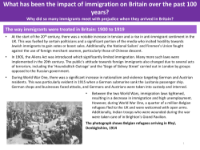Why did so many immigrants meet with prejudice when they arrived in Britain? - Presentation

History Resource Description
The impact of immigration on Britain over the past century has been significant, and immigrants have often met with prejudice upon their arrival. The presentation outlines that during the early 20th century, anti-immigrant sentiments were stoked by politicians and media, leading to the introduction of the Aliens Act in 1905, which restricted immigration. Acts of terrorism, such as the 'Houndsditch Outrage' and the 'Siege of Sidney Street', further changed public attitudes towards immigrants. World War One saw heightened nationalism and violence against German and Austrian residents, exemplified by the reaction to the sinking of the Lusitania passenger ship. Between the World Wars, immigration laws became stricter, and while a quarter of a million Belgian refugees were welcomed, Indian troops wounded in the war were cared for in Brighton's Grand Pavilion.
From 1919 to 1948, Britain experienced the rise of anti-Semitic fascists, leading to the Battle of Cable Street where Jewish and non-Jewish communities stood together against racism. Jewish refugees from Nazi Germany faced a mixed reception, though the Kindertransport of 1938 and 1939 saved about 10,000 Jewish children. Post-World War Two, Polish servicemen were allowed to settle in the UK, and many colonial troops had fought for Britain during the war. However, the period from 1949 onwards saw Commonwealth migrants facing racial discrimination, despite the British Nationality Act. The presentation highlights the Bristol Bus Boycott as a response to employment discrimination, and the difficulties black immigrants faced in finding jobs due to the prejudices of the time. It also touches upon the violent attacks by white gangs on black communities, the government's negative portrayal of West Indians, and the Commonwealth Immigrants Act of 1962, which aimed to reduce black immigration. The presentation encourages reflection on the contribution of black workers, particularly in the NHS, and the misconceptions held by many white Britons about the black community.




